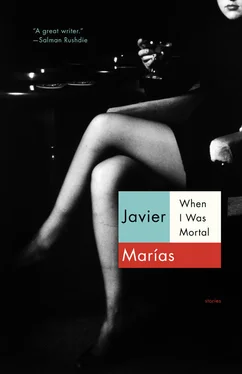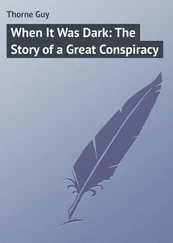The woman was almost naked, wearing just a pair of knickers, there was no trace in the house of any other items of the clothing she must have arrived in, as if the spear-thrower had scrupulously gathered them up after the murders and taken them away with him, nobody walks down the street or travels in a taxi like that, however hot it is, I mean not naked like that. Perhaps that was a joke too: I’m going to leave you there naked, you whore, that way you can go on being screwed all the way to hell. An unnecessary hassle for a murderer in any case, everything that remains accuses, everything that remains on our hands. The woman was about thirty, judging by her appearance and by the forensic report, and, judging by her appearance alone, she could have been an immigrant, Cuban or Dominican or Guatemalan, for example, she had bronzed skin, full, slightly cracked lips and prominent cheekbones, but there are a lot of Spanish women like that too, in the south and in the centre and even in the north, not to mention the islands, people are less easy to classify than we might think. She had her eyes closed and an expression of pain on her face, as if she hadn’t died immediately and had had time to make that involuntary gesture, the agony of the iron entering her flesh and having entered her flesh, her teeth instinctively clenching and her vision clouding, her nakedness experienced suddenly as a kind of extra defencelessness, it’s different if a sharp weapon first has to penetrate fabric, however fine, than if it pierces the skin directly, although the results are identical. That’s what I think anyway, not that I’ve ever been injured in that way, touch wood, fingers crossed. The woman was wounded beneath her left breast, both of which looked soft, as far as I could make out and given that I was looking at them for the first time in photos, hardly ideal. But you get used to imagining the texture and volume and feel of women the first time you see them, especially in these deceitful times, if she’d been rich she would have had silicon implants, especially at her age, a kind of consubstantial softness impervious to passing time. Her breasts were smeared with dried blood. She had long, tangled, curly hair, and part of her hair covered her right cheek in a rather unnatural fashion, as if she had had time to pull her hair over her face in an attempt to cover it, a final gesture of modesty or shame regarding her anonymous posterity. In a way, I felt sorry for her, I had the feeling that her death was secondary, that it wasn’t really to do with her or that she was only part of the decor. She had some semen in her mouth and, according to the report, the semen belonged to Dorta. It also said that some of her teeth were decayed, the teeth of a poor woman, or the victims of sweets. It also said that substances were found in both organisms, that was the word, “substances”, what exactly it didn’t say, though I don’t find it particularly hard to imagine.
Both were in a seated position, or rather they weren’t lying down, but reclining, although in the case of my friend I was not spared one particularly unpleasant detail: the rusty spear had penetrated him with such force that the point, never honed or polished or even cleaned since it arrived from Kenya — but extremely sharp — had gone straight through his chest into the wall, leaving him pinned to the plaster like an insect. If someone had told Dorta about this, he would have shuddered to think of the plaster left inside the body when the spear was removed, someone had to take it out, it would undoubtedly have required more force than that used by the person who had impaled it in the two chests, one female, one male. The weapon had not been thrown from any distance, it had been thrust in from below, possibly at a run, possibly not, but if not, the person holding it must have been either very strong or accustomed to bayonetting. It was a large bedroom, there was enough space to take a run-up, the whole of Dorta’s apartment was very large, an old apartment that had been renovated, a legacy from his parents, he only bothered about two areas, the living room and the bedroom, the place was too big for him. He had just turned thirty-nine, he bemoaned the fact that his fortieth birthday was just around the corner, he lived alone, but often invited people round, one at a time.
“The worst thing about ages is that they always seem so alien,” he said to me the night of his death, during supper. His birthday had been a week before, but I hadn’t been able to celebrate it with him then because he’d been away in London that day. I hadn’t been able to make the traditional jokes, I was three months younger than him and, during those three months, I used to call him “granddad”. Now I’m two years older than he will ever be, I’ve turned the corner. “A few days ago, I read a newspaper article about a man of thirty-seven, and, in fact, the association of that age and the word ‘man’ seemed quite appropriate, at least for that individual. For me, on the other hand, it wouldn’t. I still unconsciously expect people to refer to me as ‘a young man’, and, of course, I expect them to call me ‘tú’, yet I’m two years older than the man in the article. I think only other people should have birthdays. No, I’d go further, just as in the past the rich would pay a poor person to do their military service or to go to war instead of them, it should be possible to engage someone to have our birthdays for us. Every now and then, we would have one ourselves, this year is mine, I’m bored with being thirty-nine. Don’t you think that would be an excellent idea?”
It would never have occurred to either of us that, in his case, thirty-nine would be the fixed number with which he could bore himself until the end of time with absolutely no possibility of changing it. That was the kind of idea Dorta came up with when he was in good spirits and in a good mood, rather silly, mad ideas, a bit daft and invariably puerile, which was quite justified, at least with me, because we’d known each other since we were children and it’s hard not to continue to behave with a person the way you would have behaved when you first met: if you were a bit of a fusspot, then, from time to time, you should continue to be so; if you were cruel, if you were frivolous, if you were enigmatic, shifty, weak or beloved, we have a different repertoire for each person, the contents of which we are allowed to vary but not relinquish, if someone laughed once they will always have to laugh, otherwise, they will be rejected. And that is why I always called Dorta “Dorta” and that is how I remember him, at school you were known by your surname until you reached adolescence. And just as when you stay in touch with someone, you continue to see superimposed on their adult face the face of the child with whom you once shared a desk, as if any later changes or any accentuation of certain features were a mask and a game intended to conceal the essence, so the achievements or failures of the various ages of the other person seem unreal or rather fictitious, like the plans or fantasies or imaginings or fears with which childhood is peopled, as if between those friends whatever happened still seemed to be and was still experienced as a hope — the primary childhood state of mind is not even desire — the present as well as the past and even the distant past. With such friends very little can be taken absolutely seriously because you’re used to everything being pretend, introduced explicitly by those formulae that you later abandon when you go out into the world, “Let’s play at …,” “Let’s pretend that …,” “I’m the leader now” (you only abandon them verbally, in reality it all goes on the same). That’s why I can talk of his death dispassionately, as if it were something that had not yet happened, but was part of the eternal waiting for all that is unlikely and impossible. “Imagine someone killed me with a spear.” A spear, in Madrid. But sometimes passion surfaces — or possibly rage — for just those reasons, because I can imagine the anguish and panic that night of a person I still see as a nervous, resigned child whom I often had to defend in the playground, and who would later apologize and give me a book or a comic because he’d forced me to get into a fight with the heavies when there was no need for me to do so — not that he ever asked for my help, he just let himself be punched or pushed around, that’s all; but I saw it — to waste my energies on someone who could never win in a physical fight and whose glasses ended up on the ground almost every day of every school year. It’s unforgivable that he should have died a violent death, even though he never knew what happened. But that’s pure rhetoric, who doesn’t know when they’re dying? I wasn’t there to see him and to go into battle for him, although it was a near thing.
Читать дальше












